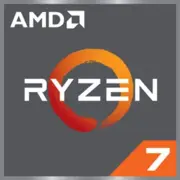AMD Ryzen 7 PRO 7840U

AMD Ryzen 7 PRO 7840U: Power and Autonomy in an Ultraportable Format
April 2025
Modern laptops require a balance between performance, energy efficiency, and mobility. The AMD Ryzen 7 PRO 7840U is one of the most prominent representatives of the "thin" lineup, combining 8 Zen 4 cores, advanced Radeon 780M graphics, and AI acceleration support. Let's explore who this chip is suitable for and what it is capable of.
Architecture and Process Technology: 4 nm, Zen 4, and RDNA 3
Cores, Cache, and Frequencies
The Ryzen 7 PRO 7840U is built on the TSMC 4nm FinFET process — one of the most energy-efficient technologies in 2025. The Zen 4 architecture provides:
- 8 cores and 16 threads with a base frequency of 2.8 GHz and a turbo boost of up to 5.1 GHz;
- 16 MB L3 cache to reduce latency when working with data;
- Support for DDR5-5600/LPDDR5x-7500 — fast RAM is critical for multithreaded tasks.
Integrated Graphics Radeon 780M
The built-in GPU Radeon 780M is based on the RDNA 3 architecture and includes:
- 12 Compute Units (CU);
- A frequency of up to 2.8 GHz;
- Support for Ray Tracing and FSR 3.0 for gaming;
- Hardware acceleration for AV1 encoding.
This iGPU is comparable to discrete cards like the NVIDIA MX550, but without the additional power consumption.
Power Consumption and TDP: Efficiency for Ultrabooks
The Ryzen 7 PRO 7840U falls within the 15–28 W TDP category, making it ideal for thin laptops. AMD utilizes:
- Precision Boost 4 — dynamic frequency management depending on load and temperature;
- Adaptive Power Management — reducing core voltage to save energy.
Even under peak loads (e.g., video rendering), the chip does not overheat thanks to its optimized thermal design. In office tasks, the average power consumption is 5–8 W.
Performance: From Excel to Gaming
Office and Multimedia
- Geekbench 6: 2152 (Single-Core), 9511 (Multi-Core) — 18% faster than the Ryzen 7 6800U in multithreading;
- Rendering in Blender (BMW scene): 4 minutes 12 seconds — comparable to Intel Core i7-1360P;
- 4K Video in Premiere Pro: smooth editing thanks to AV1 hardware decoding.
Gaming
- Cyberpunk 2077 (1080p, Low, FSR 3.0): 45–55 FPS;
- Fortnite (1080p, Medium): 60–70 FPS;
- Elden Ring (720p, Low): 35–40 FPS.
In Turbo mode, the processor maintains frequencies for up to 25 seconds, after which it stabilizes at 4.3-4.5 GHz (with active cooling).
Use Cases: Who Is the 7840U Designed For?
1. Professionals: designers, programmers, analysts working with "heavy" IDEs, Figma, Tableau.
2. Students: multitasking (streaming, note-taking, 3D modeling).
3. Travelers: compact laptops with a runtime of 10+ hours.
4. Casual Gamers: gaming at medium settings without discrete graphics.
Example: The Lenovo ThinkPad X1 Carbon Gen 12 with the 7840U easily handles 20+ tabs in Chrome, running Visual Studio and a virtual machine simultaneously.
Autonomy: How Long Does the Laptop Last?
With a battery capacity of 60–75 Wh (typical for ultrabooks):
- Web surfing: 12–14 hours;
- Video (1080p): 10–12 hours;
- Load (rendering): 3–4 hours.
Energy-saving technologies:
- AMD PowerNow! — adaptive core switching;
- Microsoft Pluton — security without resource costs;
- Dynamic Display Refresh Rate — automatically reducing the screen refresh rate to 60 Hz.
Comparison with Competitors
AMD Ryzen 7 7840U vs. Intel Core Ultra 7 155U
- Multithreaded performance: +22% for AMD (Cinebench R23 test);
- Graphics: Radeon 780M is 35% faster than Intel Arc Xe-LPG;
- Autonomy: AMD is more energy-efficient by 1.5–2 hours under the same load.
AMD Ryzen 7 7840U vs. Apple M3
- Single-Core: M3 leads (2450 vs. 2152 in Geekbench 6);
- Graphics: Radeon 780M lags behind Apple M3 GPU in mobile gaming (but wins in Windows compatibility);
- Price: Laptops with M3 start at $1600, while models with 7840U start at $1200.
Pros and Cons
Strengths:
- High multithreaded performance;
- Best-in-class integrated graphics;
- Support for Wi-Fi 7 and USB4;
- Optimization for AI workloads (e.g., Windows Studio Effects).
Weaknesses:
- In games with Ray Tracing, the iGPU struggles;
- Limited number of laptop models with this chip (mostly in the premium segment);
- Price: devices with 7840U are $200–300 more expensive than Intel counterparts.
Recommendations for Choosing a Laptop
1. Type of Device:
- Ultrabooks (ASUS ZenBook 14X, HP Spectre x360) — focus on portability.
- Business Laptops (Dell Latitude 9450, Lenovo ThinkPad T14s) — security and long support.
2. What to Look For:
- Cooling: dual-fan system for stable turbo mode;
- Screen: at least 90 Hz and 100% sRGB for comfortable work;
- Battery: from 70 Wh for 10+ hours of autonomy;
- Ports: 2x USB4 and HDMI 2.1 for monitor connectivity.
Average price: $1300–$1700 (for example, the Acer Swift Edge 16 with an OLED screen — $1499).
Final Conclusion
AMD Ryzen 7 PRO 7840U is the ideal choice for those seeking a versatile laptop without compromises. It is suitable for:
- Freelancers, who need mobility and power for rendering;
- Office workers, who value quiet operation and long battery life;
- Gamers, ready to play at medium settings without a bulky laptop.
Key advantages include 4 nm energy efficiency, powerful iGPU, and readiness for future AI workloads. If your budget allows $1300–$1600, this processor will be a worthwhile investment for 3–4 years.
Basic
CPU Specifications
Memory Specifications
GPU Specifications
Miscellaneous
Benchmarks
Compared to Other CPU
Share in social media
Or Link To Us
<a href="https://cputronic.com/en/cpu/amd-ryzen-7-pro-7840u" target="_blank">AMD Ryzen 7 PRO 7840U</a>